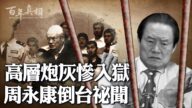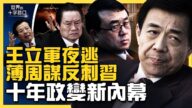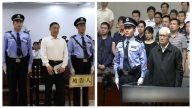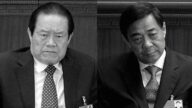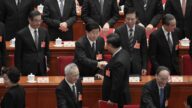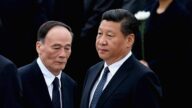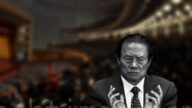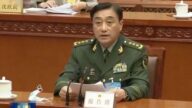【新唐人2014年04月22日訊】四月初,英國《金融時報》報導說,中共當局將在數週內公布前中共政治局常委周永康的案件。如果這樣,周永康將成為打破「刑不上常委」慣例的第一人。而美國《紐約時報》最新的報導說,不論是要消滅周永康的影響力,還是要發出一個準確無誤的信號給整個共產黨官僚,中共領導人習近平看起來想重寫規則。
《紐約時報》4月19號報導,習近平瞄準了周永康以及他的家族廣泛的商業利益,這使周永康成為中共政治局常委級別被查的第一人。按中共政治遊戲規則,這是一個大膽的動作。高級領導人家族的財務是中國最深邃和最敏感的秘密。共產黨多年來遵循一個心照不宣的規則,就是高層家屬可以從這個國家的經濟開放當中發家致富,這是獎賞他們的忠心和避免領導層的裂痕。
不論是要消滅周永康的影響力、還是要發出一個準確無誤的信號給整個共產黨官僚,習近平看起來想重寫規則。他已經擴大了對周永康的調查,包括了他妻子、兒子、兄弟和弟媳、兒媳和兒子的岳父,所有這些人在最近幾個月都被當局帶走。
《金融時報》4月1號引述知情人士的消息報導說,周永康和許多親屬被共產黨調查員拘捕,被關在一個秘密監獄。他們被控腐敗的細節將在未來數週後公開。
原中央黨校《學習時報》副編審鄧聿文之前就預測,周永康案件可能在五、六月宣佈。他告訴《新唐人》,這個事情拖得越久,對習近平就越不利。
原中央黨校《學習時報》副編審鄧聿文:因為案件已經很明朗了。關鍵是要找到他直接犯罪的證據。如果說一旦找到他直接犯罪的證據,共產黨就會公布這個案件。否則你拖下去的話,各種各樣的傳說是越來越多。而且越拖下去越存在變數。所以說能夠公布,他會盡早公布的。
《紐約時報》的報導還說,中共領導人還沒有正式談論有關周永康的腐敗調查、或他的親屬的被抓,有關習近平將如何處理案件的終極意向,仍然是一個謎。
一些政治分析家認為,像周永康這個級別的領導人不會面臨這種調查,除非習近平認為他是對自己權力的威脅。但是另外一派分析認為,習近平認為官員的子女配偶和兄弟姐妹巨額的斂財,損害了共產黨的統治穩定。
鄧聿文認為,習近平處理周永康的意圖,「反腐保黨」和「權力鬥爭」兼而有之。
鄧聿文:「一個是反腐,腐敗這麼嚴重的話,如果能夠處理周永康的話,就表明習的真心反腐,就會改善共產黨在老百姓心目中的形象。第二個目地就是有利於改革。如果把周永康治理了,改革進行不下去就是因為有很多貪官污吏,所以如果能夠處理周永康的話,改革相對來說就比較容易推進。第三個目地當然就是,這裡面有點權力鬥爭的味道。誰不聽我的話以後就治誰,這樣樹立個人權威。」
《紐約時報》採訪了周永康兒子周濱的岳母。身居美國南加州的詹敏利說,自己的外孫女——周永康的孫女被放到北京的幼兒園,因為周家其他人都被拘禁了,包括周濱夫婦和岳父。
此前有風聲說,周永康或許會逃過一劫,而僅僅由周濱承擔罪責。但是鄧聿文認為,如果只處理周濱,這個事情早就已經處理了,不會拖到現在。
鄧聿文:「周永康都打不了,你還打甚麼腐敗啊?事情都已經明擺著。全世界人民都知道,你忽然間不打了,那不說明打不下去嗎?打不下去說明你就沒有力量嘛。沒有力量你還推行甚麼改革啊?你的改革計劃就全部落空了。」
《紐約時報》說,周永康的兒子獲得銷售國營油田設備和全中國數千個加油站的合同﹔他的親家母擁有從四川省到海南省的管道和天然氣泵股份﹔他的弟媳婦投資礦產、房地產和能源項目。在周永康加入政治局常委之後,周濱控制的「中旭陽光能源科技公司」的資產攀升了六倍,2012年達到2,700萬美元。
採訪編輯/秦雪 後製/蕭宇
Xi Jinping Changes Rules, Investigation on Zhou Yongkang Widens
In early April, the U.K. based Financial Times reported that
the Chinese authorities will announce former Politburo Standing
Committee member Zhou Yongkang’s case later this month.
If so, Zhou’s case will be the first of it’s kind to break the
“untouchable" status for members of the Standing Committee.
The latest New York Times report says CCP leader
Xi Jinping appears to be rewriting the rules by
wiping out Zhou Yongkang’s influence,
and is sending an unmistakable signal to the entire party elite.
New York Times reported on April 19: “President Xi Jinping
has targeted Mr. Zhou in an extraordinary corruption inquiry,
a first for a Chinese party leader of Mr. Zhou’s rank, and put
his family’s extensive business interests in the cross hairs.
Even by the cutthroat standards of Chinese politics,
it is a bold maneuver.
The finances of the families of senior leaders are among
the deepest and most politically delicate secrets in China.
The party has for years followed a tacit rule that relatives of
the elite could prosper from the country’s economic opening,
which rewarded loyalty and helped avert rifts in the leadership."
“Whether to wipe out Mr. Zhou’s influence or to send an
unmistakable signal to the entire party elite, Mr. Xi appears
to be rewriting the rules.
He has widened the inquiry into Mr. Zhou to include his wife,
a son, a brother, a sister-in-law, a daughter-in-law
and the son’s father-in-law, all of whom have been taken away
by the authorities in recent months,
according to relatives and witnesses."
An April 1 Financial Times report says,
“Mr Zhou and his relatives are being held in the kind of
secret prison that security agents under his control sent
people regarded as a threat to the party."
The FT report also says sources familiar with the investigations
say, “Details of their alleged corruption
should be made public in the coming weeks,"
Former deputy editor Deng Yu-Wen of Study Times,
the Central Party School’s weekly journal,
predicts Zhou’s case may be announced in May or June.
He told the NTD that the longer it takes,
the more unfavorable it is for Xi Jinping.
Deng Yu-Wen, former Study Times deputy editor:
“The key is to find direct evidence of crime because
the case has been very clear.
Once the evidence is found, the Chinese Communist Party
will publicize the case.
Otherwise, the longer it takes,
the more rumors and changes it may have.
They will try to publicize it as soon as possible if they can."
New York Times reports: “Officially, the Chinese leadership
has said nothing about the corruption investigation
into Mr. Zhou or the detention of his immediate relatives,
and Mr. Xi’s ultimate intentions about how to handle the case
remain a matter of speculation."
“Some political analysts argue that a leader of Mr. Zhou’s
status would not face an inquiry of this kind unless Mr. Xi
regarded him as a direct threat to his power.
In other words, Mr. Zhou is the loser in a political struggle.
His family’s financial dealings lost their immunity
only because Mr. Zhou fell from favor,
not because elite business dealings were being criminalized."
Deng Yu-Wen says that in taking care of Zhou Yongkang,
Xi’s intent is to both gain strength for power struggles and
protect the party under the banner of fighting corruption.
Deng Yu-Wen: “The first purpose is anti-corruption.
If he can really deal with the Zhou Yongkang case,
it shows Xi is really against corruption.
The second purpose is to improve the Communist Party’s
image in people’s minds, which benefits his reform campaign.
It’s hard to reform because of a lot of corrupt officials.
The third purpose is to establish his authority in infighting."
The New York Times interviewed Zhan Minli,
mother-in-law of Zhou Yongkang’s son Zhou Bin,
in her home in Southern California.
“She said her granddaughter — who is also Mr. Zhou’s
granddaughter — has been left in the care of a kindergarten
in Beijing because the rest of the family is in custody."
Earlier rumors said Zhou Yongkang might be able to escape;
but Zhou Bin will take the responsibility.
But Deng Yu-Wen says that it would have been dealt with
long ago if only it meant only dealing with Zhou Bin.
Deng Yu-Wen: “If you can’t deal with Zhou Yongkang,
how can you speak of anti-corruption?
You’ve been touting anti-corruption in front of the whole world,
and yet now you suddenly stop?
Doesn’t that show you can’t do it? It means you have no power.
Since you have no power, how can you reform? It’s all in vain."
The New York Times says Zhou Yongkang’s son,
“landed contracts to sell equipment to state oil fields
and thousands of filling stations across China.
His son’s mother-in-law held stakes in pipelines
and natural gas pumps from Sichuan Province in the west
to the southern isle of Hainan.
And his sister-in-law, working from one of Beijing’s
most prestigious office buildings, invested in mines,
property and energy projects."
The report says the assets of Beijing-based Zhongxu Solar
Energy Research Institute “climbed more than six fold
in the years after Zhou Yongkang joined the Politburo
Standing Committee in 2007, to $27 million in 2012."
Interview & Edit/Qin Xue Post-Production/Xiao Yu


